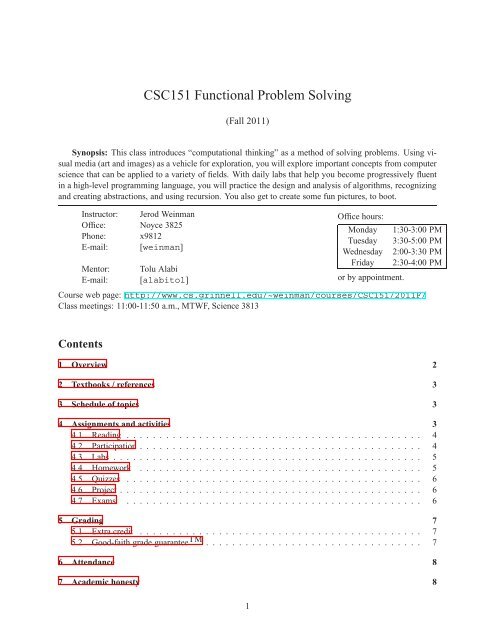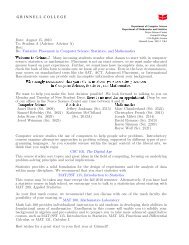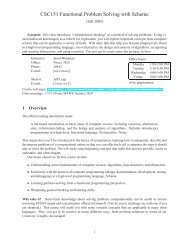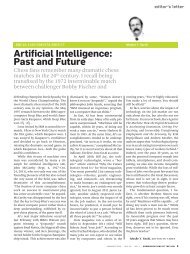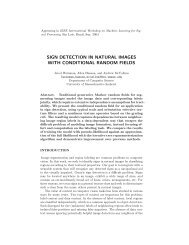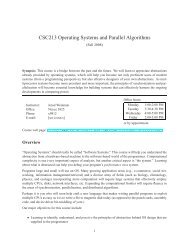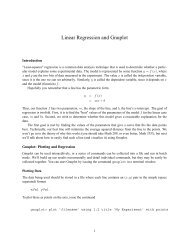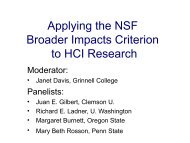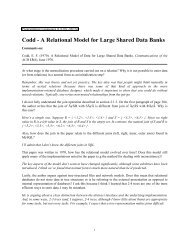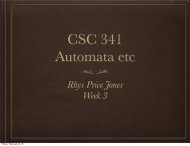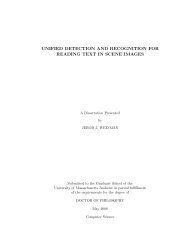CSC151 Functional Problem Solving - Computer Science - Grinnell ...
CSC151 Functional Problem Solving - Computer Science - Grinnell ...
CSC151 Functional Problem Solving - Computer Science - Grinnell ...
Create successful ePaper yourself
Turn your PDF publications into a flip-book with our unique Google optimized e-Paper software.
<strong>CSC151</strong> <strong>Functional</strong> <strong>Problem</strong> <strong>Solving</strong><br />
(Fall 2011)<br />
Synopsis: This class introduces “computational thinking” as a method of solving problems. Using visual<br />
media (art and images) as a vehicle for exploration, you will explore important concepts from computer<br />
science that can be applied to a variety of fields. With daily labs that help you become progressively fluent<br />
in a high-level programming language, you will practice the design and analysis of algorithms, recognizing<br />
and creating abstractions, and using recursion. You also get to create some fun pictures, to boot.<br />
Instructor: Jerod Weinman<br />
Office: Noyce 3825<br />
Phone: x9812<br />
E-mail: [weinman]<br />
Mentor:<br />
E-mail:<br />
Tolu Alabi<br />
[alabitol]<br />
Office hours:<br />
Monday<br />
Tuesday<br />
Wednesday<br />
Friday<br />
or by appointment.<br />
1:30-3:00 PM<br />
3:30-5:00 PM<br />
2:00-3:30 PM<br />
2:30-4:00 PM<br />
Course web page: http://www.cs.grinnell.edu/~weinman/courses/<strong>CSC151</strong>/2011F/<br />
Class meetings: 11:00-11:50 a.m., MTWF, <strong>Science</strong> 3813<br />
Contents<br />
1 Overview 2<br />
2 Textbooks / references 3<br />
3 Schedule of topics 3<br />
4 Assignments and activities 3<br />
4.1 Reading . . . . . . . . . . . . . . . . . . . . . . . . . . . . . . . . . . . . . . . . . . . . . 4<br />
4.2 Participation . . . . . . . . . . . . . . . . . . . . . . . . . . . . . . . . . . . . . . . . . . . 4<br />
4.3 Labs . . . . . . . . . . . . . . . . . . . . . . . . . . . . . . . . . . . . . . . . . . . . . . . 5<br />
4.4 Homework . . . . . . . . . . . . . . . . . . . . . . . . . . . . . . . . . . . . . . . . . . . 5<br />
4.5 Quizzes . . . . . . . . . . . . . . . . . . . . . . . . . . . . . . . . . . . . . . . . . . . . . 6<br />
4.6 Project . . . . . . . . . . . . . . . . . . . . . . . . . . . . . . . . . . . . . . . . . . . . . . 6<br />
4.7 Exams . . . . . . . . . . . . . . . . . . . . . . . . . . . . . . . . . . . . . . . . . . . . . 6<br />
5 Grading 7<br />
5.1 Extra credit . . . . . . . . . . . . . . . . . . . . . . . . . . . . . . . . . . . . . . . . . . . 7<br />
5.2 Good-faith grade guarantee TM . . . . . . . . . . . . . . . . . . . . . . . . . . . . . . . . . 7<br />
6 Attendance 8<br />
7 Academic honesty 8<br />
1
8 Deadlines 9<br />
9 Getting help 9<br />
10 Accommodations 10<br />
1 Overview<br />
The official catalog description reads:<br />
A lab-based introduction to basic ideas of computer science, including recursion, abstraction,<br />
state, information-hiding, and the design and analysis of algorithms. Includes introductory<br />
programming in a high-level, functional language. Prerequisites: None.<br />
This means that you’ll be introduced to the basics of computation, learning how to adequately describe and<br />
decompose problems of a computational nature so that you can effectively tell a computer the steps it should<br />
take to solve the problem. We will study some beginning concepts that make this process possible, easier to<br />
undertake, and often elegant.<br />
Our major objectives for this course include:<br />
• Understanding some fundamentals of computer science: algorithms, data structures, and abstraction.<br />
• Familiarity with the practice of computer programming (design, documentation, development, testing,<br />
and debugging) in a high-level programming language, Scheme.<br />
• Learning problem-solving from a functional programming perspective.<br />
• Sharpening general thinking and learning skills.<br />
Why take it? Some basic knowledge about solving problems computationally can be useful in careers<br />
involving every major and concentration offered at <strong>Grinnell</strong>. (I invite you to challenge me with one if you<br />
are skeptical.) This course will outfit you with some versatile concepts that are applicable to most other<br />
programming languages. Plus, you get to be creative in many different ways, from problem solutions to<br />
works of art. Creativity is highly encouraged!<br />
Important warnings<br />
Important! Experience shows that CSC 151 exercises different parts of your brain than other courses (even<br />
math and science courses). Expect some challenges, but have confidence that you can work through<br />
them and that you’ll come out of the course with much more knowledge.<br />
Important! Like learning a foreign language, learning in this course is cumulative: New ideas often build<br />
on ideas from earlier in the course. If you feel like you’ve missed something important, please come<br />
talk to me right away.<br />
Important! <strong>Computer</strong>s have no common sense or compassion. They are complex, and sometimes they do<br />
things we don’t expect. When things go wrong, don’t blame yourself. Ask me or a tutor for help.<br />
In addition, we are using software (MediaScript) that has been developed at <strong>Grinnell</strong> and may still have<br />
some bugs lurking within. It is entirely possible that it may crash for no good reason. Thus, you should<br />
develop a habit of saving your work frequently (or subconsciously twitch control-S to save, as I do).<br />
2
2 Textbooks / references<br />
There is no required textbook for this course, as the material has been written by <strong>Grinnell</strong> faculty and will<br />
be posted on the web. However, there are some useful textbooks and references you may want to bookmark<br />
or keep handy.<br />
Books<br />
Dybvig, Kent R., The Scheme Programming Language (Third Edition), MIT Press, 2003.<br />
http://www.scheme.com/tspl3<br />
An effective reference and guide to learning the Scheme language.<br />
Felleisen, Matthias, Findler, Robert Bruce, Flatt, Matthew and Krishnamurthi, Shriram, How to<br />
Design Programs, MIT Press 2001.<br />
http://www.htdp.org<br />
A wonderful guide, particularly for later topics in the course like higher-order programming, re-factoring,<br />
and recursion.<br />
References<br />
Kelsey, Richard, Clinger, William, and Rees, Jonathan, editors, Revised 5 Report on the Algorithmic<br />
Language Scheme. 1998.<br />
http://www.cs.grinnell.edu/~weinman/courses/<strong>CSC151</strong>/doc/r5rs.pdf<br />
The complete, concise definition of the Scheme programming language version we are using.<br />
3 Schedule of topics<br />
The following is an approximate schedule of topics to be discussed during the course. See the web page<br />
schedule for details.<br />
Week Topic Week Topic<br />
1 Introduction 8 Geometric art<br />
2 Numbers, procedures, graphics 9 Characters, vectors, data structures<br />
3 Design, images, color 10 Analysis, testing, association lists<br />
4 Documentation and iteration 11 Higher-order procedures, search<br />
5 Booleans and conditionals 12 Sorting<br />
6 Lists and recursion 13 Objects<br />
7 Preconditions, local procedures 14 Files, summary, review<br />
4 Assignments and activities<br />
This class is taught in a collaborative workshop style. Some days we will spend working through problems<br />
or concepts in an interactive fashion. Most days, you’ll work on laboratory problems on the computer with<br />
other students.<br />
To make class time most valuable for you, I do not plan to lecture on material that is covered in the<br />
reading. Instead, because experimenting and practicing is the best way to learn, you’ll have the opportunity<br />
to ask questions and then begin working collaboratively on the day’s lab exercises with the instructor and a<br />
class mentor available to provide assistance.<br />
3
By studying the day’s topics beforehand, we can concentrate the beginning of class on areas of confusion.<br />
Because our class time is limited, you must come prepared to each class, meaning you should:<br />
1. Check the schedule for the day’s meeting to find out the topic.<br />
2. Study the assigned material before class.<br />
3. Come to class on time, with paper and something to write with, ready to participate.<br />
Under a normal 16 credit load, I expect that you will spend at least (but hopefully more) 40 hours per<br />
week on your studies (class time, homework, and studying). 1 Thus, you should plan to spend at least 10<br />
hours/week on work for this course. With class time clocking in at 3 1 3 hours, you should have at least 62 3<br />
hours/week left for the remaining activities.<br />
4.1 Reading<br />
Nearly every day there will be a brief reading assigned. Before each class, you should check the course web<br />
page for the reading. Reading the material may entail the following:<br />
Overview You should look over the reading once to get an overview of the material to be covered (see<br />
section headers and summaries).<br />
In-depth Next, study the material closely. You should try some of the examples in the text as you read.<br />
Perhaps not everything will make sense at this point, but hopefully many or most things will.<br />
Final notes After carefully reading the material, make a few notes to yourself about what you think are the<br />
most important concepts being covered, as well as any questions you have.<br />
These important readings are short, but may introduce non-trivial ideas. Some details will make more sense<br />
as you try things out on your own in lab, but I am always happy to take questions, which may be answered<br />
or deferred to a hands-on exercise.<br />
4.2 Participation<br />
Because much of our work in this course involves collaboration and discussion, you will be evaluated on<br />
your participation.<br />
Participating in class involves:<br />
• being present in class (physically and mentally)<br />
• coming to class on time<br />
• coming to class prepared<br />
• asking questions when appropriate<br />
• making positive contributions to class discussion by volunteering and when called upon<br />
• staying on task during lab exercises, and<br />
• working effectively with your lab partner(s)<br />
1 This is a minimum recommendation for achieving “satisfactory” (i.e., C-level) results. “Good” or “excellent” results may<br />
require a greater investment.<br />
4
Students who regularly meet these criteria can expect to earn 90% for their participation grade. I will reward<br />
students who regularly provide significant insights or guide discussion in productive ways with a higher<br />
participation score. Students who fail to participate regularly (e.g., demonstrating a lack of preparation or<br />
involvement during lab exercises) or who participate in counterproductive ways (e.g., by dominating the<br />
conversation, making inappropriate comments, or getting off-task) can expect to earn a lower score.<br />
4.3 Labs<br />
Most class days will involve collaborative laboratory work. You might not complete the laboratory assignments<br />
during class. It is very important that you finish these outside of class to be sure that you are engaging<br />
in all the covered material. Like playing an instrument or speaking a foreign language, the only way to<br />
become proficient is to practice, practice, practice! You will be expected to carefully write up your solutions<br />
to some lab exercises. Lab write-ups will be announced at the end of class. For this reason, but most<br />
importantly for your records, you should keep a careful record of your work as you progress through the lab.<br />
Deadline When a lab is to be written up, I will let you know at the end of the class session in which it is<br />
conducted. Lab write-ups are due by the beginning of class on the specified date. You can view which labs<br />
are due and when on the course web labs page.<br />
Submission You and your lab partner(s) may submit your write-ups jointly (if you complete it together)<br />
or individually (if you complete it separately, outside of class).<br />
If you complete the lab on your own, acknowledge your partner’s contributions in your writeup. If<br />
you submit the lab together, only one submission is required. However, all group members are jointly<br />
responsible for ensuring a submission is made. (For example, if your partner told you he would submit a lab<br />
but he forgets to, you will both receive a zero.) For this reason, I recommend submitting labs while you are<br />
sitting together and including all named group members in the Cc: line of the e-mail.<br />
Submit your lab write-up in the body of an email (do not send an attachment) by the beginning of class<br />
the day it is due. That means the top of the hour sharp, not two minutes after, when it will be considered<br />
late.<br />
The subject of the email should be of the form "CSC 151-02 Lab: Title of Lab".<br />
Format Your write-up should include your solution to each exercise in the lab. If the exercise directs you<br />
to write Scheme code, include your Scheme code. If the exercise directs you to find out what the output of<br />
some expression is, copy and paste the output from the MediaScript console. If the exercise asks a question<br />
or asks you to explain something, write an answer in English. You do not need to copy the entire lab into<br />
your write-up (please don’t!), but do include the problem number for each exercise.<br />
Grading Lab write-ups will be graded on a binary scale, 0 or 1. You will earn a 1 if your write-up includes<br />
a solution or evidence of serious effort for each exercise in the lab, and a 0 if the write-up was not turned<br />
in or if some exercises are not attempted. If you were not able to complete some exercises because of their<br />
difficulty, you can still earn full credit by explaining where you got stuck and coming to talk with me as<br />
soon as possible.<br />
In short, every diligent student should earn full credit for lab write-ups.<br />
4.4 Homework<br />
A homework assignment is due each Tuesday night (when there is no project or exam). The homework is<br />
intended to let you learn and apply some new algorithms and ideas, rather than merely checking that you’ve<br />
5
learned the basic concepts (as the quizzes do). However, they are not intended to be huge undertakings. If<br />
you find the assignments are consistently taking longer than 3-4 hours, please talk to me.<br />
I will give you instructions about what forms of collaboration are permitted on each homework assignment.<br />
Since I want to give you room to go above and beyond the requirements of the assignment, homework<br />
will be graded on a simple ternary scale:<br />
PLUS (105%) Exhibits exceptional insight, creativity, and/or craftsmanship<br />
CHECK (90%) Meets the requirements of the assignment.<br />
MINUS (70%) Does not meet the requirements of the assignment.<br />
I expect most work to receive checks. Of course, no credit will be given if nothing is submitted. The<br />
course schedule includes eight homework assignments; your lowest homework grade will be dropped.<br />
4.5 Quizzes<br />
Each Friday, there will be a short, written quiz covering one or two key ideas from the previous week.<br />
Because lab work is done in pairs, the quizzes are intended to check each individual student’s understanding<br />
of these ideas in a timely fashion (i.e., well before the examinations). If you (or the class as a whole) are<br />
missing a key concept, I want to revisit that concept as soon as possible so we can build on it in later lessons.<br />
The course schedule includes 12 quizzes; your lowest quiz grade will be dropped. Because the goal of<br />
the quizzes is to check that you have learned basic skills, an answer that is basically correct will receive full<br />
credit, even if there are minor syntax issues. For code, my rule of thumb is that the code is basically correct<br />
if I believe you could quickly make it work at the computer (and it uses the required ideas). A partially<br />
correct answer will receive partial credit at my discretion.<br />
If you require accommodations for these quizzes, please come talk with me as soon as possible.<br />
4.6 Project<br />
The course will also include one more substantial project, in which you will have an opportunity to exercise<br />
your creativity in working on a program over two weeks. I will inform you of the grading rubric when the<br />
project is assigned.<br />
Project Assigned<br />
Detailed Proposal<br />
Complete Submission<br />
Wednesday 9 November<br />
Tuesday 15 November<br />
Tuesday 22 November<br />
4.7 Exams<br />
As opportunities for you to demonstrate your programming and design prowess, there will be three takehome<br />
exams and an optional final exam. The following are their due dates, though they will be distributed<br />
5-7 days in advance of the due date.<br />
Exam 1<br />
Exam 2<br />
Exam 3<br />
Final Exam<br />
Tuesday 20 September<br />
Tuesday 1 November<br />
Monday 5 December<br />
Wednesday 14 December (9 am)<br />
You should find the exams challenge you to go beyond what we have done in class.<br />
6
Midterm take-home exams Take-home exams are open notes, open computer, and open instructor. However,<br />
because I intend the exams to assess your own individual understanding of the material, collaboration<br />
on exams is not permitted. You should not talk to anyone (except me) about take-home exams before they<br />
are due. You should not discuss the problems on the exam, nor your answers, with anyone else. You should<br />
not give any information about your progress on the exam (e.g., which problems you have completed or<br />
which you found difficult), and neither should you ask others about their progress. If you have any doubt<br />
about what is and is not permissible, ask the instructor.<br />
Final exam The final exam can be used to replace your lowest score on one other examination. Although<br />
the final for this class is optional, you may end up deciding to take it. Therefore I encourage you not to make<br />
airline reservations that will conflict with your final exam schedule.<br />
Unlike the others, the final will be an in-class exam. Talking with other students during the exam will<br />
not be permitted. You may ask me questions. The exam will be closed-book and closed-computer, but you<br />
will be allowed to use one double-sided, 8.5"x11" sheet of hand-written notes.<br />
5 Grading<br />
My goal is for everyone taking this course to be able to demonstrate familiarity, fluency, and excellence with<br />
the course concepts. I would be very happy if you all met the goals above and received “A”s. The following<br />
weighting of individual activities will provide a basis for evaluation,<br />
Participation 10%<br />
Homework 20%<br />
Project 10%<br />
Quizzes 20%<br />
Exams 30%<br />
Labs 10%<br />
Some work may be graded by someone other than the instructor. However, any questions or concerns<br />
about grading should only be directed to the instructor.<br />
5.1 Extra credit<br />
Successfully undertaking an activity for extra credit will add 1/2 of a percentage point to your final score.<br />
I will propose opportunities for extra credit throughout the semester, and you may propose ideas as well. I<br />
may limit this form of extra credit to 4 points.<br />
To earn this extra credit, you must send me an email with a paragraph summarizing what you learned<br />
within one (1) week of the event. Do not send a summary of the content. It is more interesting for me to read<br />
your reflections on the content than a recapitulation of it.<br />
5.2 Good-faith grade guarantee TM<br />
Because I realize that computer science does not “click” will all students, I reward effort as well as outcome.<br />
Hence, students who make a good faith effort in this class will pass the class with at least a C. A good-faith<br />
effort includes:<br />
• missing no more than two classes,<br />
• turning in every homework assignment, and<br />
• spending the requisite time on each examination.<br />
7
6 Attendance<br />
Because is a collaborative, discussion-based course, your presence is integral to your learning. Thus, 1.5%<br />
will be deducted from your overall grade for each absence. I know that sometimes “things happen.” Therefore,<br />
you will be granted one unexcused absence from class without penalty. However, this one-time rebate<br />
is void upon a second absence.<br />
If you are absent, I would appreciate a written explanation (email is appropriate). If you know in advance<br />
that you will be absent for any reason, please notify me in writing (again, email is fine) at least 7 days in<br />
advance to make arrangements for considering your absence excused.<br />
Because I do not wish you to risk harm to yourself or others, I am likely to moderate penalties in case<br />
of illness.<br />
If you do miss a class, you must first talk to a classmate about any material that you may have missed.<br />
After that, you may follow up with me about any further questions or concerns.<br />
You should complete the lab assigned for any days you are absent and be sure you understand the<br />
material.<br />
7 Academic honesty<br />
You, as students, are members of the academic community. Both the College and I expect the highest standards<br />
of academic honesty. (See the <strong>Grinnell</strong> College Student Handbook, e.g.,<br />
http://www.grinnell.edu/offices/studentaffairs/shb/academicpolicies/academichonesty).<br />
Among other things, this means clearly distinguishing between work that is your own, and work that should<br />
be attributed to others. This includes ideas and examples that you draw from labs and readings.<br />
It is expected that the collaboration policies given in this syllabus and on particular assignments will be<br />
followed. In particular:<br />
• When you explicitly work as part of a group or team, you need not identify the work of each individual<br />
(unless I specify otherwise).<br />
• You may discuss concepts (algorithms, ideas, approaches, etc.) described in the readings, lab exercises,<br />
or during class with anyone.<br />
• You may only discuss homework assignments (algorithms, solutions, write-ups, code, debugging, etc.)<br />
with your group members, computer science tutors, CSC 151 mentors, or the CSC 151 instructors.<br />
• All the work submitted (code, experimental data, write-ups, etc.) must be your own or that of your<br />
group. Code or documentation provided by the instructor must be attributed. No other code or written<br />
work (from any source) may be shared with others or copied for your own use.<br />
• All non-syntax consultations (i.e., ideas about algorithms) from any source, including the readings,<br />
labs, provided code, and internal or external language references, require formal citation within the<br />
related program or write-up.<br />
• Any conceptual contributions by individuals not in your group must be acknowledged and attributed<br />
in your report. That is you must give specific attribution for any assistance you receive.<br />
(This includes from tutors or mentors.) The suggested acknowledgment format is<br />
“[Person X] helped me to do [thing Y] by [explaining Z].”<br />
• Any program results or output must be faithfully recorded, not forged. (A thoughtful explanation of<br />
unexpected behavior can often be a worthwhile submission and is much better than the alternative.)<br />
8
• You are responsible for safeguarding your work from being copied by others. This requires you to<br />
take reasonable precautions with hard copy printouts as well as file system permissions. (Note that<br />
MathLAN’s default permissions prevent others from viewing your files.)<br />
As an instructor, I will meet my obligation to bring any work suspected to be in violation of the College’s<br />
Academic Honesty Policy to the attention of the Committee on Academic Standing, after which there is no<br />
recourse with me.<br />
8 Deadlines<br />
Work is due at the time and date specified in the assignment. Each calendar day your work is late will reduce<br />
your grade by one level (exams excluded). Work must still be submitted by the due date if you have arranged<br />
a prior excused absence.<br />
Because I am concerned about your health and well being, I may also accept late work (exams excluded)<br />
if<br />
1. you start the assignment at least three days in advance of the due date;<br />
2. you expend a reasonable amount of effort to complete the assignment by midnight;<br />
3. you send me an e-mail attesting to facts 1 and 2 with whatever work you’d completed when the<br />
assignment is due;<br />
4. you go to sleep after sending that e-mail; and<br />
5. you make an appointment to talk with me immediately about any problems you’ve had on the assignment.<br />
Deadlines for assignments involving programming will automatically be extended by at least one class<br />
period if MathLAN is down for an unscheduled period of 3 or more hours during the two days preceding the<br />
assignment due date.<br />
Absolute deadline: All work (except the final) must be submitted by Monday 12 December (Note that<br />
this is earlier than the institutional deadline.)<br />
9 Getting help<br />
The Math Lab makes tutors for 151 available for help in the open laboratory, SCI 3815. These tutors can<br />
be found at regularly scheduled times, which are posted on the front door. Our student tutors may also be<br />
available for regular, more intensive one-on-one tutoring. As the course gets underway, please let me know<br />
if you are interested.<br />
Of course, you can also get help from me. Please come by during my office hours to discuss the course<br />
content, get any extra assistance, or just talk about how the course is going. Note that if multiple students<br />
have similar questions or issues, we may work together as a group.<br />
If you cannot attend a scheduled office hour, you may also email me to schedule an appointment; please<br />
include 3-4 possible meeting times so that I can find one that works for both of us.<br />
I enjoy getting to know my students, but I prefer to reserve office hours for academic matters. If you<br />
would like to have a more informal conversation, I would be delighted to accept an invitation to eat lunch<br />
with you at the Marketplace.<br />
Email is also a reliable way to contact me, but please allow 24 hours for a response (except on weekends,<br />
when I do not regularly read email). You may also call me in my office (x9812) for more urgent matters<br />
(e.g., you will be missing a lab due to illness).<br />
9
10 Accommodations<br />
If you have any disability that requires accommodations, please meet with me right away so that we can work<br />
together to find accommodations that meet your learning needs. You will also need to provide documentation<br />
of your disability to the Dean for Student Academic Support and Advising, Joyce Stern, located on the 3rd<br />
floor of the Rosenfield Center (x3702).<br />
Please also note that I require your accommodations. The chemical fragrances found in lotions, after<br />
shave, body sprays, scented laundry products, perfume, cologne, etc. make many people who suffer with<br />
asthma, allergies, environmental sensitivities, cancer, and migraines much sicker. I am sensitive to many<br />
chemicals you may not even notice, so please try to avoid using such scented products before coming to<br />
class and especially if you visit my office.<br />
Thanks to Janet Davis, Sam Rebelsky, and Henry Walker for many elements of this syllabus.<br />
10


